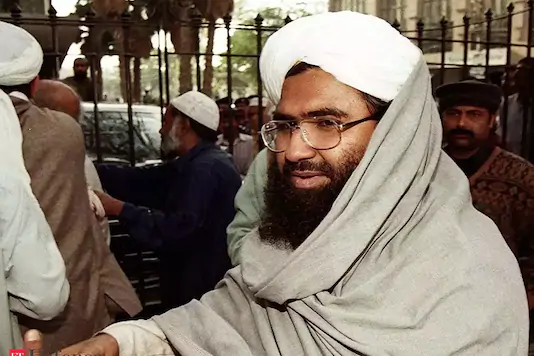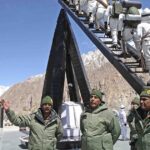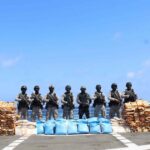
SOURCE: NEWS18
Even as the United States prepares to draw down the last of its remaining forces in Afghanistan, hundreds of Jaish-e-Muhammad jihadists have been located at training and logistics facilities in the country, Indian intelligence sources have told News18. The facilities, the sources said, have been provided by Mullah Muhammad Yakub, the Taliban’s new military chief, and a graduate of Jaish training facilities in Pakistan.
President Donald Trump has said he wants the last of 4,500 United States troops in Afghanistan home by Christmas, and emergency preparations have begun to pull back at least 2,000 before he leaves office, reports say.
In ongoing negotiations in Doha, the Taliban have agreed to prevent attacks by transnational jihadist groups like al-Qaeda against the United States and its allies, but there is no specific reference to Pakistan-based groups like the Lashkar-e-Taiba or Jaish.
Two residents of Bahawalpur, in Pakistan’s Punjab province, confirmed the claims by Indian officials, telling News18 several local Jaish personnel—sent home after India’s airstrikes on a seminary at Balakot last year—have left towns and villages across the area in recent weeks.
Following the Balakot airstrikes, Pakistan had announced it was placing the Jaish’s headquarters in Bahawalpur, the Markaz Osman-o-Ali, under government administration. The Bahawalpur residents, though, said the seminary was functioning normally, and that Jaish leaders had resumed holding fundraising and recruitment meetings at mosques in Punjab and Khyber-Pakhtunkhwa and Sindh.
“There are Jaish guards with guns standing outside the seminary,” one Bahawalpur resident said. “The government is not running the seminary, the Jaish is.”
“In this century,” the Jaish chief wrote in an article circulated online last week—using the pseudonym Amir-e-Mohtaram, or ‘most respected of the commanders’—“the mother of jihad has been Afghanistan”. “The ocean of rewards in jihad is Afghanistan, the place that defeated three superpowers.”
Afghan officials have long reported facing Jaish and Lashkar fighters alongside Taliban forces, with hundreds participating in battles. Last month, Helmand provincial governor Muhammad Yasin Khan said last month that hundreds of Pakistani fighters from the Lashkar and Jaish had participated in a fighting to seize the town of Lashkargah.
The United Nations Security Council group monitoring terrorism-related sanctions in Afghanistan was told, this summer, that up to 1,000 Jaish and Lashkar fighters were fighting alongside the Taliban, “acting as advisors, trainers and specialists in improvised explosive devices”.
In turn, the Taliban and its al-Qaeda associates are believed to have provided the Jaish technologies and techniques to penetrate the Line of Control, ranging from GPS-guided drones, to the training of Indian jihadists to execute complex suicide missions. In September, for example, small drones were used to lift assault rifle ammunition across the Line of Control in Akhnoor—an effort to redress severe shortages of arms and ammunition.
Fearing sanctions from the multinational Financial Action Task Force on terrorism, Pakistan has kept a tight lid on cross-Line of Control terrorism. The new Afghan bases, Indian intelligence services believe, will allow an escalation of violence in Kashmir, without the risks of exposure that come with maintaining substantial terrorism infrastructure on Pakistan’s soil.
“Kashmir’s movement might seem buried deep under the soil,” Jaish-e-Muhammad chief Masood Azhar Alvi announced last week in the jihadist group’s house-journal, Medina, “but those who have the eyes to see hidden things know it has been planted like a landmine, primed to explode at just the right moment”. “India’s entire military will get stuck in Kashmir,” Azhar continued. “The problem we will face is how to hold so many ugly and rotten prisoners of war.”
“This is not a joke,” Azhar added. “I am writing this with the greatest responsibility.”
Long-standing relationships with both Azhar and Pakistan’s Inter-Services Intelligence may have led Yakub—the son of Mullah Muhammad Omar, the Taliban’s founding patriarch—to renew the Jaish-Taliban relationship. Yakub was appointed to lead the Taliban’s military commission this summer, and has presided over a sharp escalation of violence since against Afghan civilian and military targets.
A graduate of Azhar’s alma mater, the Binori Town seminary in Karachi, Afghan intelligence sources claim Yakub received military training at Jaish-e-Muhammad facilities in Pakistan-occupied Kashmir in the early 2000s.
Nizamuddin Shamzai, the chancellor of Azhar’s alma mater, the sprawling neo-fundamentalist Binori Town seminary in Karachi, played a key role in backing the jihadist groups who would flower into the Taliban. In 1979, his student Irshad Ahmed founded the Harkat-ul-Jihad-ul-Islami to fight in Afghanistan. The organisation split in 1984, with Fazlur Rehman Khalil founding the Harkat-ul-Mujahideen in defiance of Qari Saifullah Akhtar’s leadership.
From 1988, when al-Qaeda first appeared on the battlefield of Khost in Afghanistan, both groups collaborated with Osama bin Laden. Failing to qualify for armed service with the Harkat-ul-Mujahideen because of his weight, Azhar was instead used as a propagandist and fundraiser, even travelling to Africa and Europe.
In 1994, Azhar was sent across the Line of Control to merge the two Harkat factions, and ended up being arrested by Indian authorities. The Harkat made repeated attempts to free him, notably by kidnapping Western tourists in Kashmir. He was released in 1999 in return for passengers on board a hijacked Indian Airlines flight.
Nasser al-Bahri, a bodyguard with bin Laden during the late 1990s, has claimed the slain al-Qaeda chief thought up the operation. “Bin Laden wanted Azhar freed and had ordered al-Qaeda to plan the Indian Airlines hijacking with Harkat,” he said in an interview.
Former Pakistan air force officer-turned-jihadist Adnan Rasheed wrote that he had begun his terror career after 9/11, travelling to the “Jaish-e-Muhammad office and then to the Manshera training camp”… “I stayed in their camp for 23 days waiting to go along with some other brothers to Afghanistan.” Later, Rasheed wrote, he participated in a Jaish meeting where volunteers were sought for suicide attacks in Kabul. Fifteen of 200 participants volunteered.
Evidence has also surfaced from Afghanistan’s intelligence services that the ISI provided training to Indian jihadists based in the country’s south, controlled by one-time Kashmir jihad commander Aijaz Ahanger.
Kerala residents Kallukettiya Purayil and Muhammad Muhsin, acting under Ahanger’s command, became the first Indian nationals to participate in Islamic State suicide attacks overseas, hitting a prison and a gurdwara in Afghanistan.






